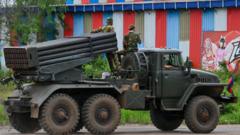While minor skirmishes are not uncommon along this forested border, this recent conflict is deeply intertwined with the political landscape of both nations. It follows a period of relative calm that included diplomatic efforts aimed at easing tensions. However, relations took a sharp downturn when Cambodia's Prime Minister, Hun Sen, leaked a private phone conversation with Thai Prime Minister Paetongtarn Shinawatra, revealing a critical tone towards her military leadership. This public embarrassment has led to her suspension as prime minister, fueling anger and betrayal within the Shinawatra family, which has longstanding political ties with Cambodia.
Both sides have accused each other of exploiting the diplomatic rift for political gain, with Hun Sen’s actions targeting the Shinawatra clan viewed as a strategic move to strengthen his nationalist credentials amid economic challenges in Cambodia. The ongoing investigations by Thai authorities into Cambodian business figures involved in underworld activities have further inflamed the situation, halting significant trade and cooperation between the countries.
Prime Minister Hun Manet of Cambodia, inexperienced in governance, finds himself in a precarious situation as both nations grapple with economic woes exacerbated by the pandemic. Thailand, facing potential punitive US tariffs, is also wary of appearing weak amidst rising tensions. The fragile political landscapes of both nations have limited their leaders' willingness to pursue compromise, yet the potential for regional organizations like ASEAN to mediate remains vital.
The mystery behind Hun Sen's decision to escalate tensions instead of maintaining diplomatic relations underscores the fluctuating nature of alliances and the intricate interplay of political motives in Southeast Asia. As conflict looms, the global community watches to see if either leader will step back from the brink.
In sum, the path forward for Cambodia and Thailand hinges on their leaders' ability to navigate long-standing grievances and emerging crises while finding a way to de-escalate the current conflict.
Both sides have accused each other of exploiting the diplomatic rift for political gain, with Hun Sen’s actions targeting the Shinawatra clan viewed as a strategic move to strengthen his nationalist credentials amid economic challenges in Cambodia. The ongoing investigations by Thai authorities into Cambodian business figures involved in underworld activities have further inflamed the situation, halting significant trade and cooperation between the countries.
Prime Minister Hun Manet of Cambodia, inexperienced in governance, finds himself in a precarious situation as both nations grapple with economic woes exacerbated by the pandemic. Thailand, facing potential punitive US tariffs, is also wary of appearing weak amidst rising tensions. The fragile political landscapes of both nations have limited their leaders' willingness to pursue compromise, yet the potential for regional organizations like ASEAN to mediate remains vital.
The mystery behind Hun Sen's decision to escalate tensions instead of maintaining diplomatic relations underscores the fluctuating nature of alliances and the intricate interplay of political motives in Southeast Asia. As conflict looms, the global community watches to see if either leader will step back from the brink.
In sum, the path forward for Cambodia and Thailand hinges on their leaders' ability to navigate long-standing grievances and emerging crises while finding a way to de-escalate the current conflict.

















